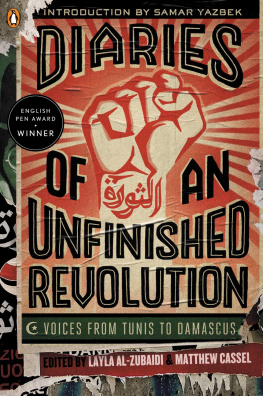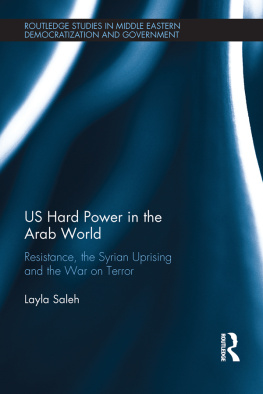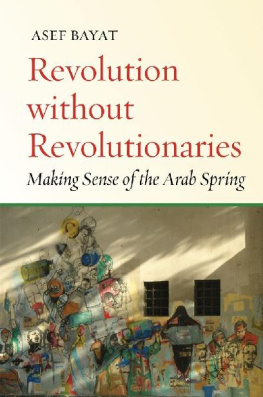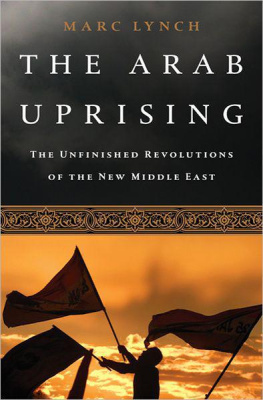Praise for
Diaries of an Unfinished Revolution
If ever there is a book that should be championed, it is [Diaries of an Unfinished Revolution].... Among the most moving, inspiring, and revealing pieces of non-fiction weve come across in some time.
The National (UAE)
[This book] provides a terrifying insight into the world of authoritarian regimes where freedom and democracy are alien concepts. Each of the eight accounts in this impressive anthology is accessible and illuminating.
The Independent (UK)
[Diaries of an Unfinished Revolution] is not the revolution itself, but its continuation with literary means. As people in the Arab world recaptured the public sphere, this book opens a literary space, in which the actors and authors of the revolutions can meet and express free of fear. It is a book that nobody can avoid if he wants to understand what is happening in the Arab world.
Diesseits
What this anthology makes abundantly clear is that the young people behind these uprisings, though often optimistic, were not blinded by the fervour of revolution but were in fact acutely aware of the obstacles that lay ahead.
London School of Economics Review of Books
These accounts...[offer] examples of heroism and of hope for the future.
If you want to understand the extraordinary happenings in the Middle East through the eyes of those who have lived through them you must read this book. These stories of horror and bravery read like testimonies to history as it was made.
For those dispirited by the lack of political and economic progress in the so-called Arab Spring countries, this amazing book reminds us that revolutions are at heart cultural, and the dam of fear that burst on 17 December 2010 unleashed a torrent of cultural production, much of the best of which is included here. There is no better way to get a feel for the power of the Arab uprisings than to read this book.
These stories of the Arab Spring are the brave first draft of history, written by its participants even as they were blinded by tear gas, arrested, running from the gunshots. Their voices are honest and compelling, by turns angry, afraid, frustrated, confused, embattled and hopeful. Amidst all the punditry and wittering commentators, here is the real feel of what it means to stand up for freedom and to risk everything in doing so.
Wendell Steavenson, correspondent for the The New Yorker and author of The Weight of a Mustard Seed
The ongoing Arab revolts debunked Orientalist myths about the region and disoriented the experts. The voices of the generation spearheading these revolts are at times drowned out by the cacophony and confusion of old and new experts issuing pre-mature obituaries. This book gives space to those men and women writing of and for monumental change and demanding attention.
Sinan Antoon, author of Ijaam: An Iraqi Rhapsody and codirector of About Baghdad
PENGUIN BOOKS
Published by the Penguin Group
Penguin Group (USA) LLC, 375 Hudson Street, New York, New York 10014

USA | Canada | UK | Ireland | Australia | New Zealand | India | South Africa | China
penguin.com
A Penguin Random House Company
First published in Great Britain as Writing Revolution: The Voices from Tunis to Damascus by I.B. Tauris & Co. Ltd. 2013
First published in the United States of America as Diaries of an Unfinished Revolution: Voices from Tunis to Damascus in Penguin Books 2013
Preface and selection copyright 2013 by Layla Al-Zubaidi, Matthew Cassel, and Nemonie Craven Roderick; Introduction copyright 2013 by Samar Yazbek; Translation copyright 2013 by Robin Moger and The Heinrich Bll Foundation; Translation copyright 2013 by Georgina Collins and The Heinrich Bll Foundation
Greetings to the Dawn: Living Through the Bittersweet Revolution copyright 2013 by Malek Sghiri; Cairo, City in Waiting copyright 2013 by Yasmine El Rashidi; Bayou and Laila copyright 2013 by Mohamed Mesrati; We Are Not Swallows copyright 2013 by Ghania Mouffok; The Resistance: Armed with Words copyright 2013 by Jamal Jubran; Coming Down from the Tower copyright 2013 by Ali Aldairy; Wishful Thinking copyright 2013 by Safa Al Ahmad; And the Demonstrations Go On: Diary of an Unfinished Revolution copyright 2013 by Khawla Dunia
Penguin supports copyright. Copyright fuels creativity, encourages diverse voices, promotes free speech, and creates a vibrant culture. Thank you for buying an authorized edition of this book and for complying with copyright laws by not reproducing, scanning, or distributing any part of it in any form without permission. You are supporting writers and allowing Penguin to continue to publish books for every reader.
This book was produced with financial support from Heinrich Bll Stiftung. The views expressed herein are, however, solely those of the authors.

LIBRARY OF CONGRESS CATALOGING-IN-PUBLICATION DATA
Diaries of an unfinished revolution : voices from Tunis to Damascus / edited by Layla Al-Zubaidi, Matthew Cassel, and Nemonie Craven Roderick ; translated by Robin Moger and Georgina Collins ; introduction by Samar Yazbek.
pages cm
ISBN 978-0-14-312515-0 (pbk.)
ISBN 978-0-698-14111-7 (eBook)
1. Arab Spring, 2010Personal narratives. 2. Political rightsArab countries. 3. Revolutionary literature. 4. Protest literature. I. Al-Zubaidi, Layla, editor of compilation. II. Cassel, Matthew (Matthew E.), editor of compilation. III. Roderick, Nemonie Craven. IV. Title.
JQ1850.A91.W75 2013
323'.04409174927dc23 2013030333
Penguin is committed to publishing works of quality and integrity. In that spirit, we are proud to offer this book to our readers; however, the story, the experiences, and the words are the authors alone.
Version_1
CONTENTS
by Samar Yazbek
Translated from the Arabic by Robin Moger
by Malek Sghiri
Translated from the Arabic by Robin Moger
by Yasmine El Rashidi
by Mohamed Mesrati
Translated from the Arabic by Robin Moger
by Ghania Mouffok
Translated from the French by Georgina Collins
by Jamal Jubran
Translated from the Arabic by Robin Moger
by Ali Aldairy
Translated from the Arabic by Robin Moger
by Safa Al Ahmad
by Khawla Dunia
Translated from the Arabic by Robin Moger
Mother of the World
PREFACE
Many of us would like to think that we experienced the 2011 uprisings in the Arab world first-hand. It was magical to watch events unfold live on TV and computer screens, across the world. As fast and as often as we could, we tweeted and facebooked articles, pictures, updates, anything to spread the word and feel involved.
For those on the ground in the Arab world, however, these events had been long in the making. Activists such as Jamal Jubran in Yemen didnt need to wait for the international media to become comfortable with calling a dictator a dictator to understand the true oppressiveness of certain governments. As he writes in his essay The Resistance: Armed with Words: Words were my weapons. Before the spotlight focused on these despots and the massive protests against them, countless people had already sacrificed everything to challenge their absolute rule.










